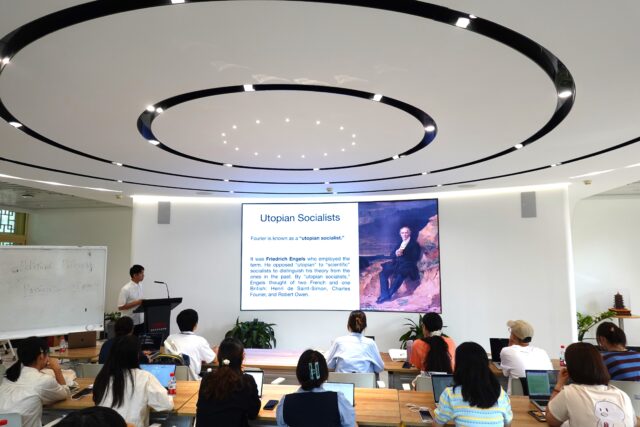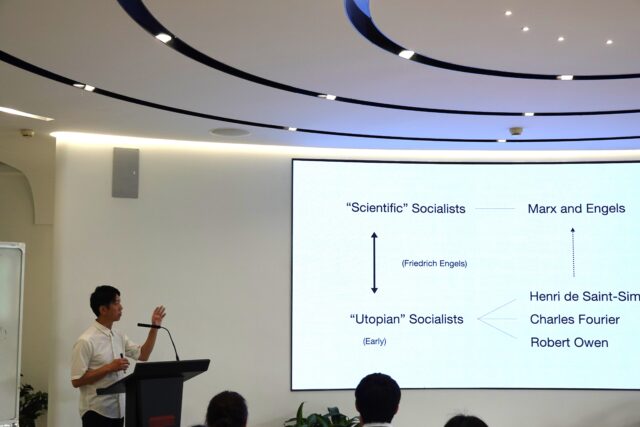As the opening speaker for the Summer Institute, Hoshino-sensei set the stage by introducing the theme of the event: “Intimacy and Feeling,” which is a profound topic to discuss given that we just overcame three long and difficult years connecting and building relationships only online before the very first in-person Summer Institute after the pandemic.

During Hoshino-sensei’s lecture, he delved into the theories of the French philosopher Fourier concerning passion, intimacy, and harmony. He used a series of clear and comprehensible diagrams to illustrate Fourier’s perspective on the ideal societal form – “harmony.” Fourier’s theories can be summarized as follows:
- Passions and Attractions: Fourier believed in embracing individuals’ unique passions and attractions instead of suppressing them. He argued that allowing people to follow their natural inclinations would lead to greater happiness and productivity.
- Phalanx Communities: Fourier’s vision of an ideal society involved small, self-sustaining communities known as phalanxes. In these phalanxes, individuals would live and work together, pursuing their passions and contributing to the collective welfare.
- The Harmony of Passions: Fourier proposed that by organizing society around the harmonious coexistence of various passions and desires, a balance could be achieved. He believed this balance would result in greater social cohesion and prosperity.
- Abolition of Social Hierarchies: Fourier’s vision included eliminating traditional social hierarchies and class distinctions, aiming to create a society where everyone had equal access to resources and opportunities.
Hoshino-sensei acknowledged that Fourier’s theories were considered radical and utopian during his time, reflecting the specific social context of the era.
Furthermore, Hoshino-sensei introduced the theory “of Gastronomy,” taken from his published work. He applied Fourier’s general theories to the intimate and microcosmic realm of the dining table, offering a unique perspective on Fourier’s ideas about intimacy.
The Q&A session that followed Hoshino-sensei’s lecture was particularly engaging. Questions, especially those concerning key variables within Fourier’s ideal societal concept of “phalanxes,” garnered significant attention. While Fourier’s ideal society optimized or disregarded factors like gender, age, class, and ancestry, there was a keen interest in how to translate such an extremely idealized vision into practical reality. Hoshino-sensei’s lecture was undeniably enlightening and thought-provoking, offering deep insights into the challenges and possibilities of Fourier’s utopian ideals and its sharp contrast with the real world.

Reported by Yuxin Tien (EAA Youth)








